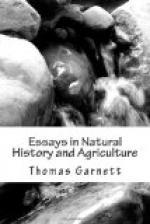I should also recommend an extension and uniformity of close time in all the rivers in the kingdom, for although it is an undoubted fact that some clean fish are caught in the river early in the season, yet they are comparatively few in number, and their capture involves that of a far greater number of spawning and Kelt fish, which are not only of no value for the table, but the destruction of which is in effect the destruction of millions of fish which would proceed from them. In the first Parl. Rep., p. 11, Mr. Walter Jamieson says, that in the river Tweed, from January 10th to February 1st, he caught one hundred and twenty-one fish, only one of which had spawned; from February 1st to March 1st he took forty-four fish, twenty-five of which had not spawned —fifteen were Kelts and four were clean fish; from March 1st to March 10th he took seventeen fish, seven of which had not spawned (four of them on the 10th)—six were Kelts and one clean fish. Now the close time varies in almost every river, and some have no close time at all; thus in the Ribble the close time begins on September 15th and ends on December 31st, and in the Hodder there is no legal close time; but there is no practical difference between them in this respect, every one thinking himself entitled to kill all the fish he can, at all times of the year, in both of them. The observance of the weekly close time, that is, opening a passage for the fish from sunset on Saturday night to sunrise on Monday morning, is a mere farce, even if it could not be evaded, as it almost invariably is, for it is well known to every one conversant with the habits of Salmon, that they only ascend the rivers when there are freshes (floods) in them, and in summer the ground is generally so dry, and vegetation absorbs so much moisture, and the evaporation is so great, that it not only requires twice as much rain to produce a flood in the river then as it does in winter, but when the rain does come its effects are only visible in the river for a short time. I have known a strong fresh in the Ribble in the morning, and the river low again in the afternoon of the same day. A fresh coming at the beginning of a week, would disappear long before the close of it, unless the rainy weather continued; and thus the strict observance of the weekly close time would be of little service to the upper proprietors unless the fresh came at the right end of the week.




